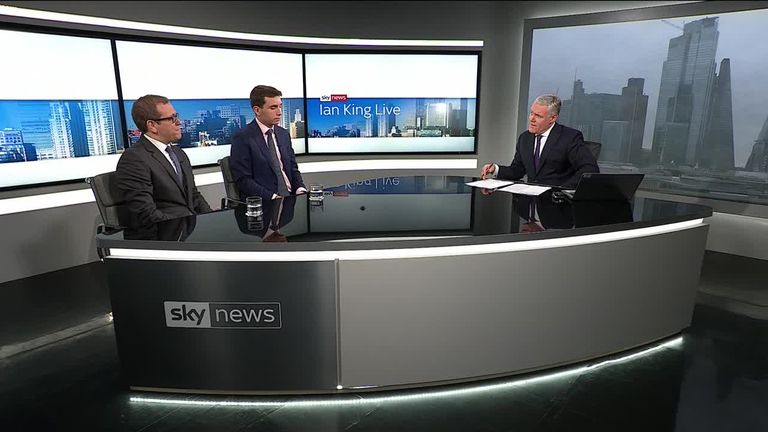Boris Johnson yet to convince firms he is on their side
Sky's Ian King says the Queen's Speech was an opportunity for the PM to offer an olive branch and post-Brexit hope to UK firms.
Tuesday 15 October 2019 06:18, UK
Today's Queen's Speech, assuming the policies it contained can be delivered, is an early preview of what a Conservative election manifesto might look like.
And although businesses do not vote in elections, apart from in local elections for the City of London Corporation, business was a key constituency that Boris Johnson was keen to please today.
Business leaders have not forgotten remarks made by the Prime Minister at a private reception in June last year.
Asked about warnings coming at the time from businesses like Airbus, over the threat posed by a 'hard Brexit' to jobs and investment, the then-Foreign Secretary retorted: "f*** business".
So Mr Johnson needed to convince businesses that, post-Brexit, he has a plan to boost growth and productivity that they can get behind.
There were certainly plenty of measures in the Queen's Speech that will have an impact on businesses.
Many look, essentially, like post-Brexit tidying up exercises aimed at replicating existing arrangements for businesses.
For example the Trade Bill, which seeks to "make the most of new opportunities that come from having an independent trade policy after Brexit", looks largely to be all about rolling over trade agreements with other countries that the UK currently has by virtue of its existing EU membership.
Similarly, the Financial Services Bill seeks to ensure "the UK maintains its world-leading regulatory standards and remains open to international markets after we leave the EU". It looks largely to be all about reducing disruption to the financial services sector after Brexit.
Yet there are elements in the proposed legislative programme that go further than seeking to minimise post-Brexit disruption. The Medicines and Medical Devices Bill, for example, is aimed at stripping out some of the bureaucracy that sometimes prevents medicines from coming to market as quickly as they might.
The government clearly thinks there is an opportunity here for the UK to further grow its already thriving life sciences sector.
The most eye-catching pledge, so far as businesses will be concerned, was the National Infrastructure Strategy promised for later in the autumn.
It aims to "set out plans to deliver a step change in infrastructure investment across the whole of the UK" by enabling developments such as the roll-out of gigabit-capable broadband, making more efficient use of the UK's airspace and improving the punctuality of Britain's trains.
It all sounds specifically designed to delight the business lobby groups that Mr Johnson provoked last year.
But as Adam Marshall, director-general of the British Chambers of Commerce, told Sky News: "A strategy is only as good as what is actually delivered."
And the proposed legislation for delivering the National Infrastructure Strategy was as notable for what was excluded as for what was actually in there.
For example, the High Speed Rail 2 (West Midlands - Crewe) Bill looks to enshrine in law the next phase of HS2 beyond the initial London-Birmingham stretch.
Yet businesses in Yorkshire, not to mention those in Liverpool and Manchester, will have noted that the Bill only provides for extending HS2 from Birmingham to Crewe. A decision to go beyond that will presumably be made once Doug Oakervee, the former HS2 and Crossrail chairman, has concluded the review into the project requested by Mr Johnson.
There was also no mention of the third runway for Heathrow Airport, something against which Mr Johnson campaigned as London mayor, although that may be because legislation enabling this particular project has already been passed.
Not all the measures unveiled today will necessarily be welcomed by business.
The government has already announced plans to further increase the National Living Wage and this will form part of employment reforms being planned. This has already caused unhappiness among employers.
The introduction of the minimum wage, by Tony Blair's government, was successful partly because the rate at which it was set was taken out of the hands of politicians and decided instead by an independent Low Pay Commission.
Yet this arrangement was effectively canned by the former Chancellor George Osborne who, in his 2015 Budget, introduced a new National Living Wage for those workers aged over 25. It would be set not by an independent commission, based on evidence, but by the Treasury.
Mr Johnson's government also intends to lower the threshold at which the National Living Wage kicks in from 25 to 21.
It is easy to see how this has the potential to antagonise businesses and especially smaller ones. It has effectively politicised the wage-setting process and raises the risk of the National Living Wage being set at a level in future that dissuades employers from hiring staff.
That is not the only interventionist measure in this Queen's Speech that will impact businesses.
Another is the Environment Bill , which will not only set legally binding environmental targets, but will also create a new regulator in the form of an Office for Environmental Protection.
A third is the "national security and investment legislation" proposed, strengthening the government's powers to intervene in takeovers and mergers, where an intervention might be justified "to protect national security".
All of this will concern businesses.
As Mr Marshall put it: "Businesses will want to be reassured that the UK remains an open environment for investment and a place where the additional costs of new regulation aren't going to fall on companies who are pretty hard-pressed enough at this moment in time."
There are a couple of proposed pieces of legislation with which few businesses will quibble. One is a reform to the insolvency laws ensuring that, when an airline has entered insolvency, it can continue repatriating passengers. This might well have been called the "Thomas Cook Bill".
The other is the proposed Pensions Schemes Bill which will, at long last, pave the way for pensions dashboards that allow savers to view all their retirement savings accounts in one place. This has been promised for many years and is long overdue.
Sadly, though, there was no sign of a reform to (or, better still, abolition of) the pensions taper introduced by Mr Osborne in 2015 that slashed tax relief on pensions savings for higher earners and which has created a staffing crisis in the NHS.
There were two elephants in the room today. One was that this programme depends on Brexit being delivered and, in time, on the Conservatives securing a majority in a subsequent general election.
The other is the government's claim that it will be pursuing "a responsible fiscal strategy".
As Paul Johnson, director of the Institute of Fiscal Studies, has pointed out, the government has already unveiled some extra £13bn worth of spending commitments, which is likely to take government borrowing to more than £50bn next year.
The government appears to be set on tearing up - or, at the very least, breaking - its own fiscal rules.
Instead, it is preparing a spending spree, the like of which has not been seen since Gordon Brown was in the Treasury and claiming - hubristically - to have abolished boom and bust.








